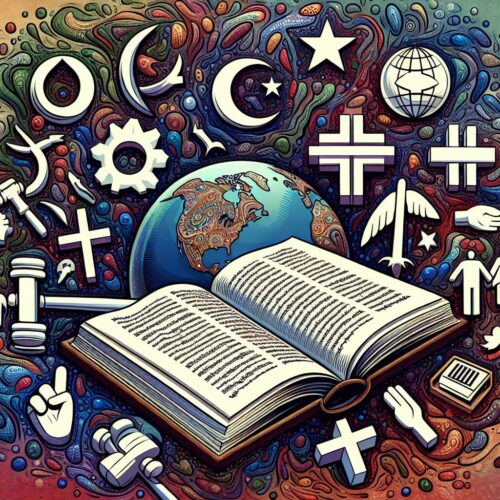When one contemplates the realms of monotheism and politics, the mind conjures up images of religious leaders guiding their followers in matters of faith and morality. However, the connection between these two domains is far more intricate, deep-reaching, and thought-provoking than a mere alliance of religious and political figures. It delves into questions of power, authority, divine mandate, and the moral dimensions that shape our societies. In this article, we embark on a journey to explore this complex relationship and shed light on the often overlooked interplay between monotheistic beliefs and politics.
The Divine Mandate: A Historical Perspective
Throughout history, monotheistic religions have exerted their influence on political structures and systems of governance. Perhaps one of the most prominent examples lies in the religious texts themselves. In the Abrahamic traditions, for instance, the Bible contains accounts of prophets and leaders who were chosen by a higher power to communicate divine will. From Moses and his leadership of the Israelites to Joshua, Samuel, and even Jesus, the intertwining of divine mandate and political authority is evident.
These religious narratives often establish a connection between the divine and political legitimacy, cultivating a belief in the sanctity of leaders and their decisions. As a result, political power assumes a moral dimension, with leaders guided by the principles of their respective faiths. This raises critical questions about the responsibilities of political leaders and the moral dimensions they must embody when wielding power.
Power and Abuse: The Fine Line
While monotheistic beliefs can provide a moral framework for political leaders, they also present a potential challenge. The convergence of power and authority brings with it the risk of abuse. History is replete with examples where political leaders have exploited religious beliefs to consolidate their power, suppress dissent, or wage wars in the name of their faith.
Political leaders wield immense authority, and when combined with the belief in a divine mandate, the potential for unchecked power becomes a real concern. The lessons of history must serve as a reminder that religious beliefs should not be used as a tool to justify oppression or illegitimate actions. Instead, they should act as guiding principles to promote justice, compassion, and societal wellbeing.
Pluralism and Tolerance: Navigating Ethical Dilemmas
In modern democratic societies, the interplay between monotheism and politics becomes even more complex. In an era of increasing religious and cultural diversity, the challenge is to strike a delicate balance between religious freedom and political inclusivity. How do we ensure that political decisions acknowledge and respect the beliefs of all citizens, while upholding secular principles and safeguarding individual liberties?
One approach lies in the concept of pluralism, which recognizes and respects the diversity of religious beliefs within a society. Pluralistic societies aim to create an environment that protects freedom of worship and expression while nurturing tolerance and understanding. By embracing pluralism, political leaders can foster an inclusive society that upholds democratic values while honoring the moral principles rooted in monotheistic beliefs.
Conclusion: The Quest for Moral Governance
The intertwining of monotheistic beliefs and politics is a topic that raises profound questions about the nature of power, morality, and our shared existence. While the potential for abuse exists, it is crucial to recognize that monotheistic principles can guide political leaders towards just governance and ethical decision-making. Striking a balance between religious beliefs and political inclusivity lies at the heart of a progressive society.
In our quest for moral governance, it is essential to engage in enlightened discussions and reflections that forge paths towards a harmonious coexistence. By recognizing the complexities of this interplay, we can navigate the realms of monotheism and politics with greater awareness, empathy, and commitment to a society that respects diverse beliefs while upholding the principles of justice and compassion. Let us embark on this journey together, fostering a world where ethics and faith converge for the betterment of humanity.
